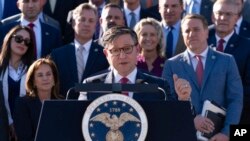Top U.S. congressional leaders on Sunday agreed on $1.6 trillion in top-line federal spending for fiscal year 2024 in a deal aimed at averting a partial government shutdown later this month, U.S. House of Representatives Speaker Mike Johnson said.
The top-line figure includes $886 billion for defense and $704 billion for non-defense spending, Johnson, a Republican, said in a letter to lawmakers on Sunday. The defense portion had already been signed into law by President Joe Biden last month through the defense spending bill.
The non-defense discretionary funding will "protect key domestic priorities like veterans benefits, healthcare and nutrition assistance" from cuts sought by some Republicans, Democratic Senate Majority Leader Chuck Schumer and House Democratic Leader Hakeem Jeffries said in a joint statement.
Their statement put non-defense spending at $772.7 billion, nearly $69 billion more than stated by Johnson. A Democratic aide said the additional money was "adjustments."
Congress was scheduled to return to Washington this week to tackle Jan. 19 and Feb. 2 deadlines for settling government spending through September, amid Republican demands to reduce fiscal 2024 discretionary spending below caps agreed to in June.
Last spring, Biden and then-House Speaker Kevin McCarthy reached agreement -- as part of a debt-limit increase deal -- on $1.59 trillion in defense and non-defense discretionary spending.
Biden said on Sunday the deal moved the country one step closer to "preventing a needless government shutdown and protecting important national priorities."
"It reflects the funding levels that I negotiated with both parties," Biden said in a statement after the deal was announced.
The Republican-controlled House and the Democratic-controlled Senate will still have to agree on how to allocate these funds.
In his letter, Johnson said the "final spending levels will not satisfy everyone, and they do not cut as much spending as many of us would like."
White House budget director Shalanda Young said on Friday she was not optimistic about reaching a deal to avoid a partial government shutdown later this month.





